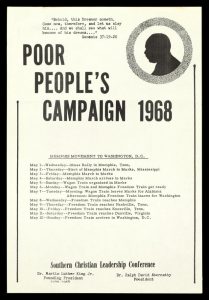The year 2017 has proven to be a year of movement nostalgia. From the 50th Anniversary of Dr. King’s Time to Break Silence speech, to the commemorations around the long hot summer of 1967 where rebellions sprung up all across the globe (most prominently in Detroit); to the ramping up of white counter-revolutionary forces and the reemergence of the Poor People’s Campaign.
I spent the last few years trying to convince myself that this country isn’t moving rapidly backwards, yet the strategies of the revolution and counter-revolution appear eerily familiar.
I find myself revisiting writings and speeches as far back as 1970 by James “Jimmy” and Grace Boggs, such as The Awesome Responsibilities of Revolutionary Leadership.
In this speech Jimmy and Grace proclaimed partly:
Meanwhile, in fact, overall conditions in the black community have been deteriorating, while at the same time the spontaneous activities of the black street masses and the much publicized but futile reform efforts of the white power structure have aroused the “white backlash,” which is only another name for the fascist counter-revolution.
There is little point in complaining about the skillful use of the Almighty American Dollar to co-opt Black Power or the rise of the fascist counter-revolution. In confusing, undermining, and mobilizing to repress the black movement, white power is only doing what its self-interest dictates. If the fault lies anywhere, it is with the black movement for failing to arm the black community theoretically and politically against the predictable strategy and tactics of the enemy and to make clear that fascism cannot be stopped short of a total revolution dedicated to ending man’s domination of man and his fear of those whom he dominates.
To do this, the black movement must recognize and keep pointing out the limits of what can be achieved by the black masses, for the same reason that Lenin insisted on the limits of what could be achieved by the spontaneous eruptions of Russian workers. The spontaneity of the workers does not take them beyond the level of the immediate, palpable, concrete interests of the everyday economic struggle, as Lenin kept pointing out. In a similar vein, black revolutionists must realize that the spontaneous eruptions of the black masses do not take them beyond the demand that white power alleviate their accumulated grievances, no matter how angry or explosive the masses are or how much Black Power talk and symbolism accompany their actions. Reliance upon spontaneity is, therefore, a form of liberalism because, in effect, it increases the illusion that the issues and grievances of the masses can be resolved without taking power away from those in power.
I find myself questioning how much we have really learned from the past. I have always been taught that if you don’t know your history, you are doomed to repeat it. I question that sentiment, because a lot of us now know our history, but it seems we are still on a trajectory to repeat it. The question for me now becomes, what then should be pulled from our history and what should be left behind?
As the reemergence of the Poor People’s Campaign ramps up, I grow more concerned about this movement moment. I worry about the counter-revolution utilizing the energy of our elder and yelder (young elder) revolutionaries to whip on the momentum of our young revolutionaries. I worry about the narrative of the acceptable negro vs. the rabble rousers. A narrative that has often been used to compare Dr. King to the Black Lives Matter Movement (BLM). A narrative that has been flung around as punishment for youthful radicalism with a Dr. King and Stokley-esq tension that has been revived and nurture d consistently over the past several years. “What would Dr. King do?” has been leveraged as a weapon against millennial activism.
d consistently over the past several years. “What would Dr. King do?” has been leveraged as a weapon against millennial activism.
We live in a moment that allows for Black Lives Matter activists to be deemed “terrorists” and “purveyors of hate” by members of the United States Government, and right-wing racists over the internet – with little uproar from the left. A moment that has placed, and continues to place youthful activists at extreme risk of being assassinated, permanently incarcerated and disappeared like many of their predecessors from the Black Panther Party. Yet, with all that these young activists and organizers have sacrificed, I rarely hear of any of them being deemed by the movement as political prisoners or revolutionaries.
Many young activists (particularly since Ferguson) who have sided with BLM have obtained felonies through their activism. Many have been harassed and threatened with violence, or worse, some have mysteriously been killed with little to no recourse for their assassinations.
I am grateful to see the fervor of activists and organizers of all generations moving in pursuit of their passions. In the words of Grace, “It’s a great time to be alive,” however, it is my hope that we do not lose sight of the fact that we are all in this together. That the struggle for liberation is multifaceted, and there has been no strategy to date that has liberated us all from the grasp of this violent system of white supremacy, nurtured by ruthless capitalism and militarism.
I am also hopeful that white allies in the struggle against white supremacy will start to move from actors on behalf of black people and people of color, toward co-liberators who recognize that their own humanity is wrapped up into the very same system that is seeking to destroy us.
I recognize, and have been taught that “all contradictions are not antagonistic,” but I also know that they can be, if left unaddressed.
All Power to Us All!



